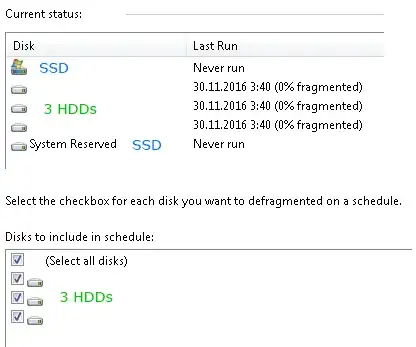A lot of us have heard before that you should "never defrag an SSD", but that seems to be only relevant for older Windows versions (like XP and below). Windows 7 and above seem to have enough understanding of how to work with SSDs to make it safe and beneficial to do routine (although not too often) defragmentation and consolidation.
This article claims that Windows (7+) should handle routine defragmentation on every installation automatically, and is enabled by default.
However, when I checked out my Windows 7's defragmenter application, it said that my 2 HDDs have been recently completely defragmented and consolidated, and that my SSD on which Windows is installed, has never even been analyzed. What gives?
I can't even select it for automatic defragmentation − neither the main, nor System Reserved partition.
But I was able to defragment it manually. It said it was >70% fragmented right after analysis, which from what I've read about random and sequential read speeds on SSDs means it could have been defragmented to improve system performance significantly.
Then I found this article from January 2009 on MSDN which says:
If solid-state media is detected, Windows disables defragmentation on that disk. The physical nature of solid-state media is such that defragmentation is not needed and in fact, could decrease overall media lifetime in certain cases.
But it's been years since then, and there have been countless updates released, and newer Windows versions have appeared, so it could have addressed by now.
Should I manually defragment my SSDs? Are there any known issues that would make it harmful on Windows 7? Additionally, what has changed between Windows 7 and 10 so that now it defragments SSDs?
